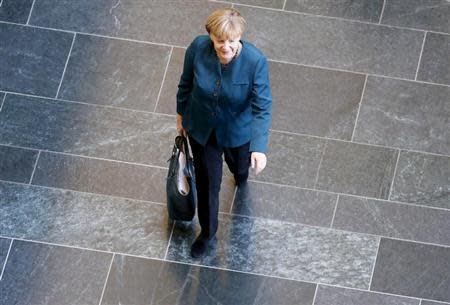Merkel backs away from debt goal before coalition talks

BERLIN (Reuters) - Angela Merkel's conservatives have backed away from a campaign pledge to use future budget surpluses to pay down German debt, as they search for new sources of revenue to fund billions of euros in investments sought by their likely coalition partner. On the campaign trail, Merkel repeatedly highlighted plans by her Christian Democrats (CDU) to begin paying down Germany's 1.3 trillion euro debt pile from 2015 as a sign of fiscal responsibility. But days before a first round of coalition negotiations with the center-left Social Democrats (SPD), one of her top deputies made clear that this was no longer a firm goal. "What is firm is that we are saying we don't want any new borrowing from 2015," CDU General Secretary Hermann Groehe said after a meeting of party leaders in Berlin. "Everything else will depend on the big picture, on economic developments and other factors." Merkel's policy shift is likely to be welcomed by Germany's European partners, who have urged Berlin to loosen its purse strings. The hope is that this will boost domestic demand, leading to a rise in German imports from struggling southern euro zone members and easing trade imbalances in the 17-nation currency bloc. The SPD has made greater public investments in infrastructure, education and research a condition for a coalition deal with Merkel, whose conservatives emerged as the strongest political force in a September 22 election but need a partner to govern. The center-left party, which came in a distant second in the vote, had wanted to raise income tax on top earners to pay for these new investments, which economists estimate could total about 20 billion euros a year. But since the CDU has ruled out tax hikes, the onus is now on Merkel to find other ways to cobble together the necessary funds. "Symbolically this is a fairly significant shift by the CDU," said Eckart Tuchtfeld, an economist at Commerzbank. "Perhaps it was not unexpected given the need to find compromises in a grand coalition. But I'm still surprised how fast the change has come." According to the most recent projections from the finance ministry, Germany's budget surplus over the 2015-17 period will total roughly 15 billion euros. With tax revenues rising at a faster pace than forecast, this total could be even higher, giving a new government more wiggle room to pay for a laundry list of spending initiatives, that also includes higher pensions for mothers and subsidies for stay-at-home parents. (Reporting by Andreas Rinke and Matthias Sobolewski; Writing by Noah Barkin; Editing by Alexandra Hudson)

